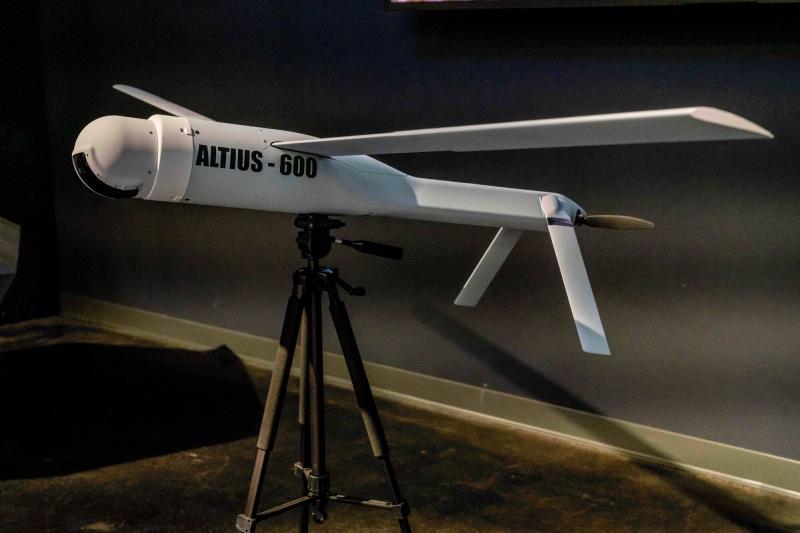The Ministry of National Defense has signed formal agreements with the US government to buy as many as 1,000 attack drones from defense contractor AeroVironment and defense tech firm Anduril Industries, according to people in the industry familiar with the transaction.
Taiwan signed a “letter of offer and acceptance” late last month, the step before signed contracts that specify quantities, dollar values and delivery dates.
Those contracts could be signed soon, according to the people, who asked not to be identified discussing the unannounced action.

Photo: Bloomberg
A US Department of State spokesperson declined to comment on any pending Taiwan sales.
Attack drones have burgeoned into a major component of modern warfare. Russian and Ukrainian forces have deployed thousands of drones to spy on each other and to carry out attacks in their ongoing war, while unmanned aerial vehicles were used in an Iranian attack on Israel in April.
The transactions demonstrate “that both Taiwan and the US are learning important lessons from the combat in Ukraine, and turning that knowledge into future procurement,” said Rear Admiral (Ret) Mark Montgomery, a senior director with the Foundation for Defence of Democracies, who has traveled to Taiwan to assess its defense needs.
In June, the US Department of State notified Congress that it had approved the sale of as many as 291 Anduril Altius 600M-V systems valued at US$300 million and as many as 720 AeroVironment Switchblade 300 “B” model drones valued at as much as US$60 million.
According to Anduril, its Altius 600M-V is a multi-mission aerial vehicle that allows a single operator to control multiple drones. It has a range of about 160km and a flight time of almost two hours.
AeroVironment’s 1.8kg model can loiter over a target for as long as 20 minutes and is equipped with a specialized anti-armor warhead. It has a range of about 30km.
Representatives at Taiwan’s office in Washington declined to comment, as did the US-Taiwan Business Council.

Taiwan has received more than US$70 million in royalties as of the end of last year from developing the F-16V jet as countries worldwide purchase or upgrade to this popular model, government and military officials said on Saturday. Taiwan funded the development of the F-16V jet and ended up the sole investor as other countries withdrew from the program. Now the F-16V is increasingly popular and countries must pay Taiwan a percentage in royalties when they purchase new F-16V aircraft or upgrade older F-16 models. The next five years are expected to be the peak for these royalties, with Taiwan potentially earning

STAY IN YOUR LANE: As the US and Israel attack Iran, the ministry has warned China not to overstep by including Taiwanese citizens in its evacuation orders The Ministry of Foreign Affairs (MOFA) yesterday rebuked a statement by China’s embassy in Israel that it would evacuate Taiwanese holders of Chinese travel documents from Israel amid the latter’s escalating conflict with Iran. Tensions have risen across the Middle East in the wake of US and Israeli airstrikes on Iran beginning Saturday. China subsequently issued an evacuation notice for its citizens. In a news release, the Chinese embassy in Israel said holders of “Taiwan compatriot permits (台胞證)” issued to Taiwanese nationals by Chinese authorities for travel to China — could register for evacuation to Egypt. In Taipei, the ministry yesterday said Taiwan

Taiwan is awaiting official notification from the US regarding the status of the Agreement on Reciprocal Trade (ART) after the US Supreme Court ruled US President Donald Trump's global tariffs unconstitutional. Speaking to reporters before a legislative hearing today, Premier Cho Jung-tai (卓榮泰) said that Taiwan's negotiation team remains focused on ensuring that the bilateral trade deal remains intact despite the legal challenge to Trump's tariff policy. "The US has pledged to notify its trade partners once the subsequent administrative and legal processes are finalized, and that certainly includes Taiwan," Cho said when asked about opposition parties’ doubts that the ART was

If China chose to invade Taiwan tomorrow, it would only have to sever three undersea fiber-optic cable clusters to cause a data blackout, Jason Hsu (許毓仁), a senior fellow at the Hudson Institute and former Chinese Nationalist Party (KMT) legislator, told a US security panel yesterday. In a Taiwan contingency, cable disruption would be one of the earliest preinvasion actions and the signal that escalation had begun, he said, adding that Taiwan’s current cable repair capabilities are insufficient. The US-China Economic and Security Review Commission (USCC) yesterday held a hearing on US-China Competition Under the Sea, with Hsu speaking on